|
Namo, Namo...:
A matter of language
By Anuradha Kodagoda
In what is being described as a radical reconciliatory move by most
media, President Mathripala Sirisena on Wednesday announced his decision
to remove the unofficial ban on signing the national anthem in Tamil.
The decision is to be publicised through a circular sent to all
government institutions.
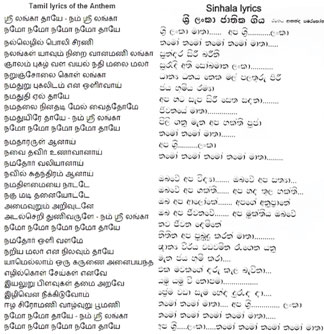 The issue of the national anthem was raised by the leader of the
Democratic Peoples’ Front (DPF), Mano Ganeshan, at the National
Executive Council (NEC) meeting held last week. The issue of the national anthem was raised by the leader of the
Democratic Peoples’ Front (DPF), Mano Ganeshan, at the National
Executive Council (NEC) meeting held last week.
The unofficial ban in singing the national anthem in Tamil came into
effect in 2010, when former President Mahinda Rajapaksa let it be known
that the government would not tolerate the national anthem being sung in
any other language other than Sinhala. The unofficial ban was in
operation in all schools and institutions that had upto then been
singing the Tamil version of ‘Namo Namo Matha’ since 1951.
Minister of Public Administration and Home Affairs, W. D. John
Seneviratne, introduced a Cabinet paper on December 12, 2010, making the
ban official. Reportedly the Cabinet paper had been drafted on the
Singaporean model where the national anthem is sung in the official
lyrics and not in any translation of the lyrics. Based on this, the
paper recommended that the Sri Lankan National Anthem only be sung in
Sinhala and the Tamil translation be abolished.
However, academics and political analysts point out that the Cabinet
paper overlooked the fact that the official lyrics of the Singaporean
national anthem is in the Malay language, which is a minority language
whereas 75% of Singaporeans are Chinese! It is so in India, where the
national anthem is not in Hindi, the most widely spoken language, but in
Bengali which is, a minority language.
Although former President Rajapaksa, who headed the Cabinet in 2010,
did not officially commit himself to Seneviratne’s proposal, word spread
that his government did not favour the use of the Tamil version.
Radical move
The international community has acknowledge President Sirisena’s move
to remove the unofficial ban as a positive sign of good governance and a
magnanimous recognition of the dignity and greatness of a nation.
National Anthem in more than one language
The major criticism brought up by nationalist-minded political
parties who claimed, that in no other country was the national anthem
used in more than one language. However the national anthems of Canada,
South Africa, Belgium, Switzerland, Suriname and New Zealand are being
sung in various other languages according to the ethnicity of these
respective countries.
History
The Sri Lankan National Anthem was written and composed by the late
Ananda Samarakoon in 1940. It was officially adopted as the National
Anthem of Sri Lanka on November 22, 1951, by a committee headed by Sir
Edwin Wijeyeratne. Samarakoon who was a student of the great Indian
musician Rabindranath Tagore and reportedly the tune had been influenced
by Tagore's genre of music.
The Sri Lankan national anthem was translated into Tamil by
M.Nallathamby and for decades, both versions were sung without any
restrictions, although only the Sinhalese version had constitutional
sanction. As the majority of Sri Lankans speak the Sinhala language,
theSinhala version of the National Anthem is mainly used in Sri Lanka
for State and private events. The Sinhala version is also the only
version used during international sports and other events.
The Tamil translation is used at official events held in Tamil
speaking areas in the North and the East of Sri Lanka. Tamil schools
throughout the country were allowed the sing the Tamil translation of
the anthem. The Tamil translation was used even when Sinhala was the
only official language of the country (1956–87).
Significance of a National Anthem
A National Anthem is considered as one of the most important aspects
of a country's independence and sovereignty. It is the umbrella under
which the country can rally and be proud of its sovereignty. The main
purpose of a country to have a national anthem is maybe, to instil
patriotism and nationalism in citizens during a time of need and crisis.
Anthems around the world often speak of very similar sentiments.
Although one of the most prevalent themes among the world's national
anthems is war and the struggles of revolution and rebellion, Sri
Lanka’s national anthem is all about the beauty, the prosperity, unity
and the many positive aspects of humanity.
It is obvious that when these sentiments are mentioned over and over
it reminds people of how their nation came to be and how they should be
proud of being who they are. Yet to understand how a short song can
bring a whole country together it is necessary to understand the anthems
themselves and how they came to be.At this point language plays a major
role.
If a country has many nationalities who speak different languages, it
is of paramount importance to have the opportunity to sing the national
anthem in their own language. If a citizen of a country has to sing the
national anthem in a different language which he/she is not familiar
with, it's a similar feeling of singing some other country's national
anthem or just another song in some other language. If the whole idea
behind having a national anthem in a country to have the patriotic ideas
alive with its citizens, what a pity if the language stands as a barrier
for a citizen to understand the real meaning and feeling of the national
anthem?
-----------------------------------------
Civil society members
and politicians say... -----------------------------------------
|
|
SLFP agrees with National Anthem sung in Tamil
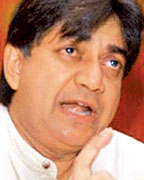 The SLFP is in agreement with the lifting of the unofficial ban
against the singing of the National Anthem sung in Tamil. MP Dilan
Perera said that the SLFP agreed 100 percent with the decision made by
President Maithripala Sirisena recently to remove the unofficial ban to
sing the National Anthem in Tamil. The SLFP is in agreement with the lifting of the unofficial ban
against the singing of the National Anthem sung in Tamil. MP Dilan
Perera said that the SLFP agreed 100 percent with the decision made by
President Maithripala Sirisena recently to remove the unofficial ban to
sing the National Anthem in Tamil.
MP Dilan Perera speaking in Parliament said “It is vital to
understand that the Tamil people have a right to sing the national
anthem in their own language just as we have the right to sing it in
Sinhala.
This is the stand taken by the SLFP and we are not afraid of the hate
speeches made by extremist groups such as the Bodu Bala Sena (BBS) who
were against this progressive step made by the President.
We must remember that this type of hate speech was one of the main
reasons for the downfall of former President Mahinda Rajapaksa. It is
high time that we understand the pulse of the common man and think as
one nation,”
President Mathripala Sirisena recently announced his decision to send
a circular to all institutions about the unofficial ban on singing the
national anthem in Tamil being lifted.
President Sirisena expressed his decision, answering the question
regarding the issue raised by the leader of the Democratic Peoples’
Front (DPF) Mano Ganeshan, at the National Executive Council (NEC)
meeting held last week.
Although the National Anthem was sung in Tamil until 2010, it was
unofficially restricted since 2010.
The next day after the President made this announcement, the BBS told
the media that the circular issued by the President regarding the
National Anthem was a violation of the Constitution and that the
President could not issue such a circular.
The media has also reported that Minister Rajitha Senaratne said that
there was no need to send a circular regarding the National Anthem
because there was no official ban. |
|
Gamini Viyangoda - Purawasi Balaya (Citizen's Power)
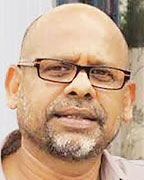 When we met President Maithripala Sirisena after his appointment as
the President, the main request we made as the Purawasi Balaya
collective was to re-establish the right of the Tamils to sing the
national anthem in their own language which was stopped by the previous
regime. When we met President Maithripala Sirisena after his appointment as
the President, the main request we made as the Purawasi Balaya
collective was to re-establish the right of the Tamils to sing the
national anthem in their own language which was stopped by the previous
regime.
We are happy with President Maithripala Sirisena's bold attempt to
allow the National Anthem to be sung in Tamil and we consider this as a
victory for citizen's power in the country. It is a myth that the
national anthem should be sung only in one language.
If the meaning is not altered, they have the right to sing it in
their language.At the recent presidential election the Tamils in the
country voted for a change and they accepted a Sinhala leader as their
President.
They are part of the country as well as the Government. This will be
an important starting point to convey the message from our end as the
majority of the people in country, to accept their rights as being equal
and to live in harmony as one nation.
For the past few decades we have destroyed all the links that would
antagonise the two nationalities. It is high time to use every
opportunity to bridge the gaps.
As a symbolic approach to win back the trust of the Tamils,the
President's decision to re-implement the rights of the Tamils to sing
the national anthem in their language is the first major step in the
reconciliation process.
|
|
Ven Athuraliye Rathana Thera - Jathika Hela Urumaya (JHU)
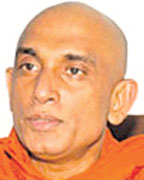 I don't think it's important to comment on this matter at this
moment.We'll see about it in the future. I don't think it's important to comment on this matter at this
moment.We'll see about it in the future.
|
Mano Ganeshan - leader of the Democratic Peoples’ Front
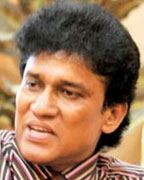 It is the Tamil people's right to sing the national anthem in
Tamil.As I raised this issue at the recent National Executive
Council(NEC),the President understood the matter and agreed to send a
circular to re-establish the Tamils right to sing the National Anthem in
Tamil. It is the Tamil people's right to sing the national anthem in
Tamil.As I raised this issue at the recent National Executive
Council(NEC),the President understood the matter and agreed to send a
circular to re-establish the Tamils right to sing the National Anthem in
Tamil.
President Sirisena also said that he would clear the matter with the
National Security Council shortly. We think it's a positive move as a
nation.
|
|
Nishantha Warnasinghe – Media Spokesperson for the JHU:
 The Tamil communities - those who live in the North and the East sang
the national anthem in Tamil in their schools and at other public
gatherings. According to the Indo-Lanka Act in 1987,the Tamil language
has been accepted as a national language in Sri Lanka. It is useless to
sing the national anthem in a language, which people don't understand or
feel and it doesn't create any patriotism in people. The Tamil communities - those who live in the North and the East sang
the national anthem in Tamil in their schools and at other public
gatherings. According to the Indo-Lanka Act in 1987,the Tamil language
has been accepted as a national language in Sri Lanka. It is useless to
sing the national anthem in a language, which people don't understand or
feel and it doesn't create any patriotism in people.
There's no issue of singing the national anthem in Tamil and we
accept this as a right of the Tamil people in our country. |
----------------------------------------- Public opinion
-----------------------------------------
Sivabalan Thivakar - Student Mannar
 The Sinhala language is not a familiar language to us. From the time
we were small we sang the National Anthem in Tamil in school.There
should be freedom to sing the national anthem in whatever language
people prefer. The Sinhala language is not a familiar language to us. From the time
we were small we sang the National Anthem in Tamil in school.There
should be freedom to sing the national anthem in whatever language
people prefer.
The ultimate decision lies with the person to decide in which
language he or she wanted to sing the national anthem.
|
 Sarath
Nishantha Kaluthara Sarath
Nishantha Kaluthara
So far I have never heard our national
anthem being sung in Tamil.Therefore I don't think it is necessary. Sri
Lankan national anthem should be sung in only Sinhala which is the
national language of the country.
|
Mahawaduge Lanthinu Peiris - Moratuwa
As a human being we all should have equal rights. It shouldn't be
more or less because of the race or the language that we speak. The
Tamil people should have the right to sing the national anthem in their
language. As Sri Lankans we should be proud if our national anthem could
be sung in different languages. I think it is a wise decision taken by
President Sirisena as always.
|
Bjoery- Tourist-Germany
 I have been here for three weeks. However we are well aware about
the30 years civil war Sri Lanka has gone through. I think this should
have been implemented soon after the war ended because a national anthem
is something which represents the harmony of the country. It is a good
decision and we wish Sri Lankans good luck as one nation. I have been here for three weeks. However we are well aware about
the30 years civil war Sri Lanka has gone through. I think this should
have been implemented soon after the war ended because a national anthem
is something which represents the harmony of the country. It is a good
decision and we wish Sri Lankans good luck as one nation.
|
Ishini Lakshika - Student, Veyangoda
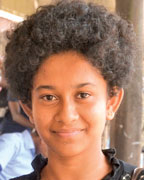 I think it is a progressive step that President Maithripala
Sirisenahas taken because it is Tamil people's right to sing the
national anthem in their own language like the Sinhalese. I think it
will help to win back the lost friendship and harmony within the Sinhala
and Tamil communities if we can assure that we would secure their
rights. I think it is a progressive step that President Maithripala
Sirisenahas taken because it is Tamil people's right to sing the
national anthem in their own language like the Sinhalese. I think it
will help to win back the lost friendship and harmony within the Sinhala
and Tamil communities if we can assure that we would secure their
rights.
|
Indira - A senior journalist
 There's no harm to permit Tamil people to sing the national anthem in
their own language. As a nation we should be united as unity has always
our strength. There's no harm to permit Tamil people to sing the national anthem in
their own language. As a nation we should be united as unity has always
our strength.
|
Anusha Sujeewani - Housewife, Battaramulla
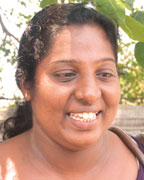 The Tamil people are also part of our country. It's vital for them to
have equal rights as the Sinhalese. I don't see anything wrong in this
decision. It's another wise decision by President MaithripalaSirisena. The Tamil people are also part of our country. It's vital for them to
have equal rights as the Sinhalese. I don't see anything wrong in this
decision. It's another wise decision by President MaithripalaSirisena.
|
|

